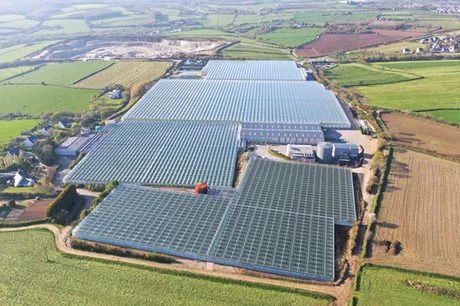The young plants are doing well in the recently opened 1.6 hectare greenhouse of Nicolas Magueur. Just like they have been doing on this location for almost thirty years now. “This brand-new facility actually is the renovation of our first greenhouse from 1990", Nicolas shows. "The new design completely focuses on optimising energy and productivity. It is more energy-efficient and brighter, with rows of equal length. Also the greenhouse is higher, which allows for larger volumes of air, therefore promoting a better climate and better growing conditions."

Les Serres Magueur - the name might reveal that it's a family business we're talking about today. The company was created in 1990 by the parents of Nicolas Magueur and has been growing vegetables ever since in Saint Renan in Bretagne, France.
The first growing acreage was only 0.75 hectare. Throughout the decades and thanks to expansion projects in 1996, 2010, 2014 and now this year the acreage is composed of 4 greenhouses totalling up to an acreage of over 9 hectare. Producing older tomato varieties for the Savéol cooperative, such as the Marquise Noire, the company has the HEV level 3 certification, and also produces tomatoes with the label “Cultivated without Pesticides”.
Technology at the service of productivity and energy
This year the first greenhouse of the company has been renovated - or rebuilt, actually. Since Nicolas is assured of the necessity to optimise the energy use in the greenhouse, he implemented many technologies based on the principles of Next Generation Growing. “The greenhouse is better insulated because the joints composing the structure are designed especially for this, which prevents losing heat through the roof. The greenhouse is equipped with heat shields in the roof and walls", he shows.
"We also set up a ventilation system under the plants, allowing for better airflow, thus activating the planting while limiting venting. If we open less, we also lose less heat, which helps us save energy.”
UV machine
In terms of water management, the family equipped this new greenhouse with a system to recycle water with a UV machine from Priva. “This system allows for a good level of disinfection on viruses and bacteria, as well as on fungi, thanks to a UV lamp. Everything is controlled by computer. The modernity of the system lies in the fact that it is connected and controlled directly with Priva software.”
To install the new greenhouse, Nicolas and Thierry, also a family member taking part in the company, used the services of suppliers like Squiban, La Coria, Podeur, as well as greenhouse manufacturer. Horconex.
The company also has also installed solar panels for self-consumption for the electricity production in 2020. “We will equip a roof with solar panels over more than 32,300 square feet, in order to compensate for a part of our annual electricity consumption.”
The main concerns of greenhouse production for the coming years
According to Nicolas, energy and labor will be the biggest challenges of the future for the greenhouse sector. “We currently use a cogeneration system to heat the greenhouses, under 12-year contracts which will soon end. At the moment, there is no interesting new contract. The cogenerations will then have to stop if there is no solution, which is a shame because it is a very interesting system."
The gas for the machine is supplied through a network of pipes. "Contrary to wood, which is transported by trucks. There is very little combustion waste released in the atmosphere and the gases are treated. The CO2 from the CHP is reinjected into the greenhouses to be consumed by the plants. Abandoning cogeneration would mean going back to gas boilers, which is not economically viable. The big question is to know how we will heat the greenhouses once the cogeneration contracts end.” Cogeneration is also a significant source of electricity production in the region, knowing that every winter, Brittany is affected by a lack of electricity supply.
“The second main concern of the sector is labor. It is getting more and more complicated to recruit labor to work in the greenhouses. This is partly due to the fact that the sector is very little known and poorly evaluated. The young graduates from agricultural schools do not go into greenhouse farming, although it is a very interesting and very versatile profession.”
The Magueur family is currently looking for a crop manager. Contact Nicolas for more information
For more information:
Nicolas Magueur
Serres Magueur
Phone: +33 2 98 84 39 38
Mobile: +33 6 86 46 95 98
nicolasmagueur@orange.fr
Facebook: https://www.facebook.com/serresmagueur29/
Linkedin: https://www.linkedin.com/in/nicolas-magueur-506286121/
